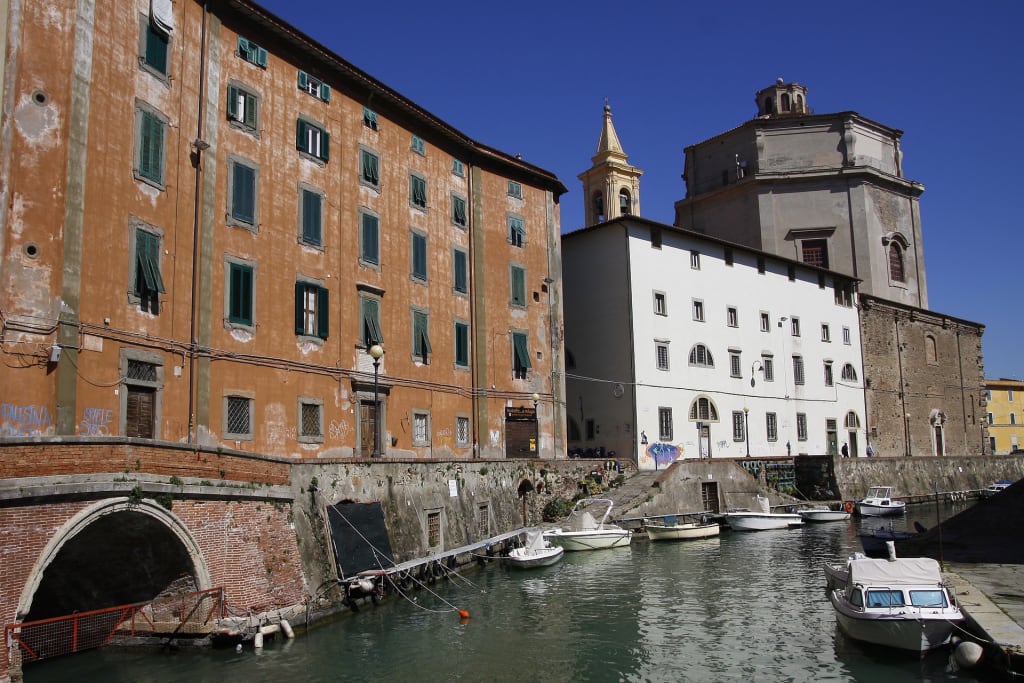Otello Chelli, "Gente della Venezia"
A Leghorn district similar to Venice

Legend has it that Otello Chelli, born in 1933, learned to read sitting next to newspaper posters. Genuine self-taught, he writes in a language where every word is literary and imbued with pathos, but he makes errors and typos that “Il Tirreno” — from which the ebook “People of Venice district” can be downloaded — has not corrected precisely because the material of this singer of the most intense labronicity must remain what it is, raw and shiny like a freshly extracted diamond, stately and popular at the same time.
Anarchist and libertarian, communist in an almost evangelical sense, Otello Chelli has behind him a long production of works both in prose and in poetry. His novel “La linea dei Morgiano”, now unobtainable, only changes hands among amateurs. What he leaves us today, at the age of eighty-one, is a real testament. Before leaving, he wants to witness a world that lives and beats only in the hearts of the last survivors. With the generosity and spirit of solidarity, at times Franciscan, that animates him, Chelli makes sure that his legacy can be enjoyed by all and can be downloaded for free from his city newspaper.
Yes, the city, that same Livorno sung by Caproni, homeland of Mascagni, Fattori, Modigliani. But not all of it, only a neighborhood, small to tell the truth, which expands and towers, stands invisible walls of moats, bridges, barriers that separate it from the rest of the Tuscan center: Venice district.
The district is so called because it recalls the lagoon city, between bridges and canals, stairways and small boats; it is architecturally very beautiful, it experienced its maximum splendor in the eighteenth century, Luchino Visconti filmed “The White Nights” there. For Chelli it constitutes a macrocosm, an entire universe, the open-air theater of his childhood dreams, the place of the soul where everything is possible.
The text is totally autobiographical but of that autobiography capable of unhinging its limits and redesigning a world, a territory and a time, populated by a crowd of men and women who seem to have come out of an act of Cavalleria Rusticana or from a painting by Eugenio Cecconi, even if the facts narrated are later and cover the arc that goes from the thirties to the postwar period. People who once were, people of the people, quick with their hands and knives, ready to wash a shame with blood and steal to feed their children, but also able to share everything with friends. People of heart who know how to help and sympathize in the literal sense of the term.
The text — we do not call it a novel because it is rather an evening of paintings, of “clips”, as the author defines them — evokes historical figures, complete with name, surname and nickname. It starts with Artemisia, mother of the protagonist.
“Artemisia had called her children to give them the usual corner of bread with something inside her to flavor it. She and Pepe Nero would have dinner in Oedipus’ fiaschetteria with a leaf of anchovies under the pesto and a liter of red wine. “
She is a less refined and less capronian Annina, sanguine, disheveled, with a ringing laugh, ready to fight like a tiger in favor of her eight children but also of her neighbors’ children; she was even able to meet the Duce in person to defend her husband from the squadristi. But, above all, generous:
“Mom could count heavily on the money earned from my trades, hunger was unknown to us, but in my hiding place, I also had one in the labyrinth of the New Fortress, the more I put in, the more the pile diminished. She couldn’t help herself. She could not feed her children while around her other children and teens watched with wide eyes and a mixed light of desire, longing and pleading. So she shared lunch and dinner with all the families living in our part of the colony and even beyond, for me she was the master of doing it, I could never call her back to moderation in daily shopping, because I fully shared that solidarity, moreover generalized, perhaps the most nice to record in those distant days of tragedy. “
After Artemisia, here is the Ciucia, to which the book of her great-granddaughter Tiziana Savi is also dedicated, “La Ciucia for all, Bruna for us”, again with the participation of Chelli. La Ciucia was a borderline character, a good and compassionate woman, who every day asked — indeed, let’s say she also demanded — alms to deliver to the soldiers and to those who suffered. She disappeared without anyone knowing anything more.
Among the characters brought back to life by Chelli, the very young and beautiful Doretta stands out, in love with a childish but carnal love, who died under the bombings.
“I have lived a long, tumultuous existence and yet, as I move towards the last stage of my journey on earth, the presence of Doretta’s restless spirit is more and more constant and sometimes I delude myself that she is waiting for the moment when my body will give in to death, to stretch out her hand, pull me up and run with me for the narrow streets, beaten by the libeccio, with ditches full of boats and life, in an immortal Venice district that will never be overwhelmed by the war that destroyed its walls on May 28, 1943, reduced its houses to ruin, erasing a splendid fairy tale and dispersed its people in a diaspora with no return ”.
And then Otello Bacci, the musician who rose to the honors of the magazine with Dapporto and Totò; and Silvano Ceccherini, former leader of a gang of thieves, former prisoner and then writer; and his brotherly friend Samson, companion of many dangerous and illegal adventures, denied by Chelli in favor of political commitment. Like Doretta, Samson is also dead and never forgotten.
“I knelt on the ground under which he had been buried and dipped a finger into the brown surface, fresh from humidity, full of the good smell of the fields and I thought of his soul: I knew how at that moment Samson was finally free.”
The three-dimensional background to the characters are the places but, especially, the historical moments. In particular three: fascism, the tragic bombings that razed Livorno to the ground during the second conflict, and the American occupation that transformed Livorno into a new Babylon of illicit trafficking, underworld, black market, “Segnorine” and black soldiers, with the pine forest of Tombolo converted into a no man’s land, a den of bandits and prostitutes.
Beyond the very lively and participatory historical reconstruction, what animates the story is the heartbreaking nostalgia for a world that has disappeared, made up of hardship, deprivation and illicit acts, but also of equality, friendship, solidarity, in full Labronic spirit. That period, that space, that neighborhood embodied the ideals that the author has pursued all his life. Otello Chelli is, in fact, an early communist, one of those who understand political commitment as a struggle, but also love, dedication, honesty and purity. Ideal destined to break and always remain unreachable. Ideals that, with the acrid taste of defeat, mix with that of regret for the youth that no longer exists, for the life that is about to end. So, this man who is over eighty, this man who, he says, has never been afraid of dying, this hard man but with the wet eyelid of the poet, bades his farewell through the lucid and desperate reaffirmation of what he has always believed in.
“I turned my back on the mound and walked towards the city where I would have faced another seventy years of tumultuous, restless, never easy life, but full of commitment and sacrifices, of pain and happiness, of ideals then broken by men, in me, however , remained alive as then and always. “
And now, even if it is not included in the text examined, we like to approach — timidly and modestly — a poem by Chelli that commemorates the figure of Artemisia with a capronian one in memory of Anna Picchi. We do it like this, without any pretense, only with the pleasure of evoking similar feelings.
THE GLASS WAGON
Giorgio Caproni
The morning sun,
in me, what a sharp thorn.
To the all-glass wagon
why did I go behind too?
They took Annina away
(in the sun) that morning.
There were four horses
(black) without rattles.
Annina with me in Palermo
she was dead at night, and in winter.
Outside there was the storm.
Then it began to dawn.
From the nearby barracks
then, even that morning,
why did it started to play
the military alarm clock?
It was the first morning
of her not being able to wake up.
IN THE DEATH OF MOTHER ARTEMISIA
Otello Chelli
I ran, with my heart pounding inside,
in the interrupted night
and in the silent, deserted corridors of the hospital,
hope slowly vanished in breathlessness
of a certainty that choked in my throat
the scream of the imminent separation from you alive.
- “The one who held me to my chest
with love,
quieted my sleep,
and gave me blood from his womb
dies. “ -
The door open on your stretched out face,
the veiled eyes, the forehead without wrinkles,
a caress and the tenuous warmth left on the skin,
like the tender breast of a featherless sparrow,
they made me the desperate child
who wept when waking up in the dark.
Now you were no longer there with your gaze,
to allay my many anxieties
and the worries of ancient research
that never gave me rest.
Death took your breath,
without the last hug of your children
and I moaned softly, with my face
resting on your reclining head.
Dawn saw me next to the cold marble,
bent over your body to remember
the best moments of life
and the bad days.
Then came the brothers and sisters,
the thousand cries, the flowers
and the polished walnut of the coffin,
the slow walking on the Aurelia,
with friends waiting ahead home
and the bricks to close our hearts
in the cold grip of pain.
Now, after the time, I went down here,
in the dark unfolding of the tombs,
in front of your portrait.
Faint lights and your smile shine,
among the whiteness of the flowers,
it is a poor image
of my mother’s shrill laugh,
when, young, beautiful and strong,
a child she was chasing along the avenue
next to the Crocetta di Saglietto.
Yet, Mom, your memory,
despite the passing of never peaceful days,
is present, well alive and accompanies me
in this life lived intensely.
Your body has returned to the earth
that shatters around and is reborn
from scattered ashes
of a fire that has lived for sixty years.
You relive with me, with my days,
suffer and rejoice in my feelings,
you reflect in the eyes of my children,
scroll through the different pages with me
of the years that pass, falling,
one on top of the other, like autumn leaves.
About the Creator
Patrizia Poli
Patrizia Poli was born in Livorno in 1961. Writer of fiction and blogger, she published seven novels.






Comments
There are no comments for this story
Be the first to respond and start the conversation.